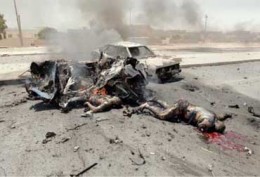After summer’s paralysing heat, most Pakistanis look forward to autumn’s balmy weather as a traditional time for picnics, leisurely meals and going out.
But the recent wave of suicide attacks and terror alerts is making families and shopkeepers nervous that their next visit to a restaurant or market in Pakistan’s capital could end in carnage.
‘We don’t go anywhere, this is not a situation for moving around or going to markets and other public places,’ said Bushra Tayyeb, a housewife in Islamabad.
‘We can’t go out to eat, to the cinema or for a picnic. My kids are getting bored at home, we’re thinking of moving abroad,’ she said.
While her 12-year-old son Danish is attending classes again after schools closed for almost a week following the suicide attack on an Islamabad university, he has been upset by the disruption. Meanwhile, thousands of children at private schools are still at home.
‘I can’t study well. I can’t go watch a movie or play in the park, I don’t know what is happening with me and this country,’ Danish said.
‘I want to enjoy my life like before. I want to move freely. I can’t sit at home,’ he said, urging the government to provide protection.
Most Pakistanis mock Islamabad as an entertainment desert compared with Karachi, which never sleeps, and Lahore, feted for its cultural sophistication, and the fear has hit restaurant and shop staff with a new malaise.
‘We were busy working until 1:00 am a few weeks back, but now we hardly make our bread and butter because people are not going out these days,’ said Haseeb Abbasi, a waiter at a roadside burger stand.
The shopping complex over the road was once a crowded hangout for youngsters but, Abbasi says, few linger there now.
Western fast-food outlets in particular fear that their US connections make them more susceptible to attack by militants.
The military’s 12-day ground and air offensive against sanctuaries of the Tehrik-i-Taliban Pakistan, which has claimed responsibility for most of the recent attacks, has only compounded fears.
‘We have lost 50 to 60 per cent of our customers in the last few days. It is all because of suicide attacks and the South Wazirstan operation,’ said Muhammad Shabbir, manager of Islamabad’s KFC.
Attacks are nothing new in Islamabad. The most spectacular — a truck bomb killed at least 60 people at the Marriott Hotel in September 2008 — led to an exodus of many foreigners.
Pakistanis have steered clear of fast-food chains for months and the metal scanners manned by guards at restaurant doors fail to reassure them.
‘We’re going to deploy more security guards and install hidden cameras but this doesn’t guarantee that nothing will happen. If a suicide bomber decides to strike here, nothing can stop him,’ Shabbir said.
Frightened shopkeepers say they feel like sitting ducks.
‘Not only are customers staying away due to security fears but we face the same threat. Anybody looking like a customer can come and explode inside our shop,’ said Mansoor Nazir, a salesman at a clothing store.
Anger is rising against the government and the security services who fail to provide adequate protection.
‘Their duty is to protect us but they can’t even place barriers and security pickets in the right places,’ said Nazir.
Policemen, who are poorly paid and lack training, liken their task to trying to find a needle in a haystack.
‘We’re here to search for terrorists and suicide bombers but it is hard to check thousands of passengers and their cars,’ said Muhammad Hamraz, a police constable in charge of a checkpoint on a major thoroughfare.
‘A suicide bomber can strike the middle of this queue, but we come to work fully prepared for death because there is no alternative,’ he said.
{Source: Dawn}

 In recent days, Taliban officials have called news organizations to contradict battlefield claims by the Pakistani military. More then four weeks ago, the Pakistani army mounted an offensive against the remote Taliban stronghold of South Waziristan. The army says it has killed hundreds of militants, a claim that cannot be independently verified. Pakistani authorities have banned foreign observers from the conflict zone.
In recent days, Taliban officials have called news organizations to contradict battlefield claims by the Pakistani military. More then four weeks ago, the Pakistani army mounted an offensive against the remote Taliban stronghold of South Waziristan. The army says it has killed hundreds of militants, a claim that cannot be independently verified. Pakistani authorities have banned foreign observers from the conflict zone.






